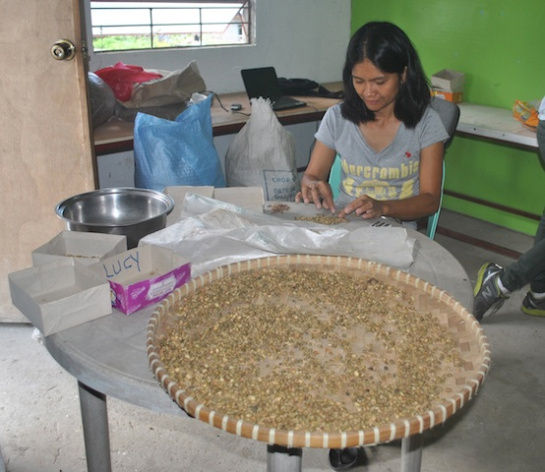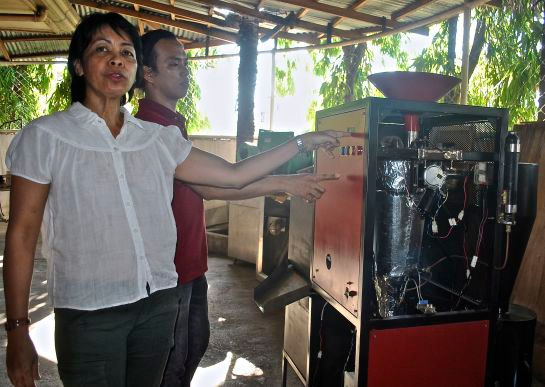Fair Trade People, 2014 World Fair Trade Day’s theme shines the spotlight on Fair Trade producers, people buying their products and other supporters who are “real drivers of the growth of Fair Trade,” organizers said.
They and their promoters, funders and volunteers are credited with leading the movement promoting social justice today. Here are some of these people in the Bote Central network:

At AgriKapihan coffee shop and headquarters of Casile-Guinting Upland Marketing Cooperative (CGUMC), coop president JoJo Andal (left) and Greg Casalme (with hat) greeted coffee roasters they would be meeting with. Andal shared about spirituality of work promoted by Saint Jose Maria Escriva, founder of Opus Dei.

CGUMC includes some of the 82 farmer beneficiaries of government’s Comprehensive Agrarian Reform program in Casile, Cabuyao City. A profile the cooperative prepared specifies that while agriculture is the main source of livelihood for Casileños,”profit proves to be incredibly insubstantial due to farmers often getting bad deals out of selling their produce. Most of the people look to the barangay council for solutions to their (mostly) personal problems, but only occasionally explore how they can increase productivity in the community.”
Andal said the cooperative was designed to bridge citizens’ woes and the projects that should address these. A program to achieve this aims to:
a) advance each members’ knowledge and techniques of agribusiness,

b) serve as a conduit for modern and effective technologies for agronomy and animal husbandry, as well as how to process them, and
c) learn techniques for proper investment, thrift and profitability resulting from their respective livelihood ventures, through their collective effort and individual capabilities.

For starters, he believes that farmers should re-learn how they till their lands and in partnership with the City Government of Cabuyao and the City Agriculture Office, the cooperative created a “Farmer’s Field School Program” where farmers are taught to abandon outdated farming practices in favor of revamped, more modern methods and technology while City Mayor Isidro L. Hemedes, Jr. granted the co-op members a mini-tiller tractor, a greenhouse, and coffee and vegetable seedlings in aid of their projects.

Today, the coop has 125 members tending roughly 25 hectares of coffee farmland, primarily growing and selling Liberica, Excelsa and Robusta coffee beans and blends (Barako ng Cabuyao & Upland Coffee Blend).

Previously, harvest period was depressing for farmers due to middlemen getting the bulk of their income instead of them, whereas now the cooperative sells their products directly to retailers and consumers at a much higher value.
For example, papaya harvests were typically pegged at a cheap Php5-10 per kilo, where today it can be bought from the cooperative for up to Php25 per kilo. Similarly with coffee, where 10 kilos used to be sold at Php280-320, is now valued at Php400 at the co-op. As members say, farmers first.
Mothers who used to only stay at home waiting for harvest time or for their children working in big companies are now employed in the co-op, earning as much as Php1,000 every week or more.

Vie Reyes showed the great difference in the income farmers get from selling raw material compared to selling the end product. She estimates that a kilo of Arabica coffee green beans selling for about 275 pesos (US $6.30) fetches up to 1,000 pesos in roasted form, and up to a total of 3,500 pesos if sold per cup as brewed coffee.
“It’s an industry with the biggest jump in price from the raw material to the end product,” Vie Reyes noted. For this reason, part of the company’s plan is to help farmers develop their business “from soil to cup.”

Citizen participation and empowerment is the core of the CGUMC, as it encourages members to develop whatever resource they have to improve their income. This is achieved through formal trainings and seminars where members are taught modern agriculture techniques that far surpass the results of old-fashioned, conventional farming.
Vie and Basil Reyes of Bote Central have helped greatly with these training needs, Andal told Catholic In Asia.
He adds that participation is not limited to its formal members though, as the CGUMC also involves the youth in various programs designed to impart knowledge of Casile’s agricultural progress.
Students from Casile National High School are given ‘short courses’ as a primer to how the Casile agribusiness works, starting from the basics: planting and growing crops.


This summer, the coop sponsored uniforms for a youth basketball team with the cutwork of a cup and basketball above it to promote working in farms. Andal said some of the youth also come to help in the farm or to roast coffee beans. Periodic meetings see participation from all members, where each and every one can and are encouraged to contribute relevant input, put forward issues that need addressing, and even plot roadmaps to determine where they could take their booming businesses next.
INNOVATION
Training on all modern technologies.Learning various ways of processing their products are also a priority for them, in order to maximize their value.

TRANSFERABILITY AND SUSTAINABILITY
CGUMC has been active for 3 years since its founding on October 20, 2011, and it shows no sign of slowing down or fading into documentation shelves of the ‘ningas-kugon’ type.
Co-op president Mr. Andal has led the program since its inception, and despite some opposition regarding certain issues on co-op policies, everyone seems intent on keeping him there for a little while longer.
The program’s desire to keep farmers updated on the latest effective agricultural practices and technology ensures that their knowledge does not stagnate nor devolve to complacent mediocrity.
TRANSFERABILITY AND SUSTAINABILITY
CGUMC has been active for 3 years since its founding on October 20, 2011, and it shows no sign of slowing down or fading into documentation shelves of the ‘ningas-kugon’ type.
Co-op president Mr. Andal has led the program since its inception, and despite some opposition regarding certain issues on co-op policies, everyone seems intent on keeping him there for a little while longer.
The program’s desire to keep farmers updated on the latest effective agricultural practices and technology ensures that their knowledge does not stagnate nor devolve to complacent mediocrity.

Cabuyeños are a health-conscious folk, and Casile is more than ready to provide the entire city with organically-grown products. Their signature Casileños Coffee Blend is a cut above their other organic goods (which are nonetheless impressive) and is already export quality, being shipped/trucked to both nearby and far-flung markets.

The rate of revenue from said products proves that there is a market for what the CGUMC, and by extension, the City of Cabuyao has to offer. The type of entrepreneurship model that the CGUMC employs pays off considerably, and figures indicate a steady growth for demand not only for their coffee, but also for products like ginger tea and squash maja as well, among others. Demand equals continuous productivity, after all.
With so much market potential being realized in their farm-to-shelf strategy, the CGUMC has no trouble winning approval from the City Government, especially when the local government units’ initial investment has already paid off and more, with this unique-in-its-own-terms cooperative on its way to self-sufficiency and a veritable revenue-generator for the city in the foreseeable future.
----------
Credits to N. J. Viehland for Catholic in Asia. Click HERE to view the original article.


コメント